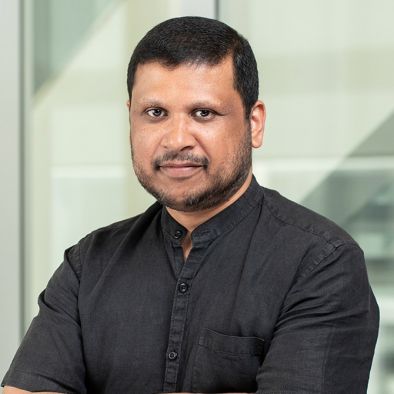Professor Harshana Rambukwella
Ph.D. Graduate and Honorary Assistant Professor
School of English
HKU

It was with great sadness that I heard the news of Harshana’s recent death on Monday, April 21, 2025, at the age of 49. He was one of my last graduate students before retirement, whose doctoral thesis I supervised from 2004-2008, a person with whom I shared many hours of scholarly debate, a colleague whose support I learnt to depend on, and a friend whose kindness I came to value.
Harshana came to the School of English as a graduate of the University of Peradaniya, the prestigious Sri Lankan university. I remember interviewing him on the telephone as part of his application. The School had just started phone interviews with overseas applicants and this was my first. The line to Colombo wasn’t great and it took a while to settle down to the official business of the interview. All the way through though, I could hear the noises of everyday life in the background, a reassuring punctuation – to me at least – that while I was in first contact with someone from a world very different from Hong Kong, we were both city people seeking a dwelling in postcolonial urban landscapes fractured by the transition from tradition to modernity.
Harshana came with a fairly clear idea that he wanted his Ph.D. to be a critique of Sri Lankan cultural nationalism through historical studies of literary and cultural discourses from the late nineteenth to the twentieth century. He had the locational knowledge and scholarly and linguistic preparation for the project. Right from the start, I was confident that he could work independently and that this was a precious encounter when supervision entailed occasional mentoring. An added bonus for me, as I believed, was that I could learn a great deal from him and usefully fill a gap in my knowledge of the global postcolonial.
This was how it turned out most of the time. Courteous and equable, he was tolerant of my idiosyncrasies and occasional harshness of tone. Our sharpest disagreement was over, of all people, Hegel. We had been working through, over a number of weeks, the linguistic machinations of postcolonial theory. I sensed that Harshana was becoming increasingly impatient with theoretical discourses that he had already experienced as an undergraduate. This finally showed through in the Hegel session; it was the shortest of our many meetings over five years. What he didn’t know – or maybe he did – was that I was looking for a shared foothold from which, despite our separate cultural provincialisms, we could launch a common position of argument, and forge a solidarity as much critical and intellectual as it was emotive and empathetic.
As he proceeded smoothly with his thesis writing, examination, and successful graduation, Harshana was, in many ways, the model graduate student. He went on to become a teacher in the School of English, taking over some of my courses in postcolonial literature and theory when I was on research leave. He also worked temporarily at the Open University in Hong Kong. In most of these years, he was joined by his lovely wife, Prashani, who worked in the banking sector in Hong Kong. They had two daughters and enjoyed their life as a young couple in Hong Kong, among their widening circle of friends at HKU and the graduate community. When my husband, Douglas Kerr, and I visited Sri Lanka in 2009, we met his father, uncle, and family members. We could not have made it from Colombo to Galle and back without the kindness and great care that they lavished on us for which we remain forever grateful. We were delighted to return a little of that kindness when Harshana visited Hong Kong with his father in 2011.
Since leaving Hong Kong, Harshana settled down to a position in the Open University of Sri Lanka and travelled frequently to Scotland, England, continental Europe and the USA. His Ph.D. thesis was published as a book in 2018. Often cited, The Politics and Poetics of Authenticity: A Cultural Genealogy of Sinhala Nationalism (London: UCL Press 2018) became and remains one of the most notable scholarly studies on his homeland. The book, his scholarly articles, professional engagements, social media presence – all consolidated and confirmed his global reputation as a leading intellectual from and of Sri Lanka.
In the Open University of Sri Lanka, he rose to become Director of the Postgraduate Institute of English, in charge of master’s programmes. A true activist and public intellectual, he was deeply engaged in social and cultural contests at home, especially over the cuts in funding to higher education. Even in the darkest days of the Covid epidemic, he was fighting to keep his graduate programmes open as a lifeline to students and colleagues.
In Harshana, the School of English has a graduate and colleague it can be very proud of. I am honoured to be his supervisor, inspired by his achievements, and cherish his memory.
Links:
https://www.facebook.com/prash.rambuks
https://island.lk/prof-rambukwella-passes-away/
Harshana's memorial is on Zoom today on May 5, 2025 (Monday):
7:00 pm, 5 May, UAE time
4:00 pm, 5 May London, United Kingdom (GMT)
5:00 pm, 5 May Berlin, Germany (CET)
11:00 pm, 5 May, Hong Kong time
Elaine Yee Lin Ho
Professor, School of English 2009-2016
Honorary Professor, School of English 2016-
Public Orator, HKU 2001-2005

